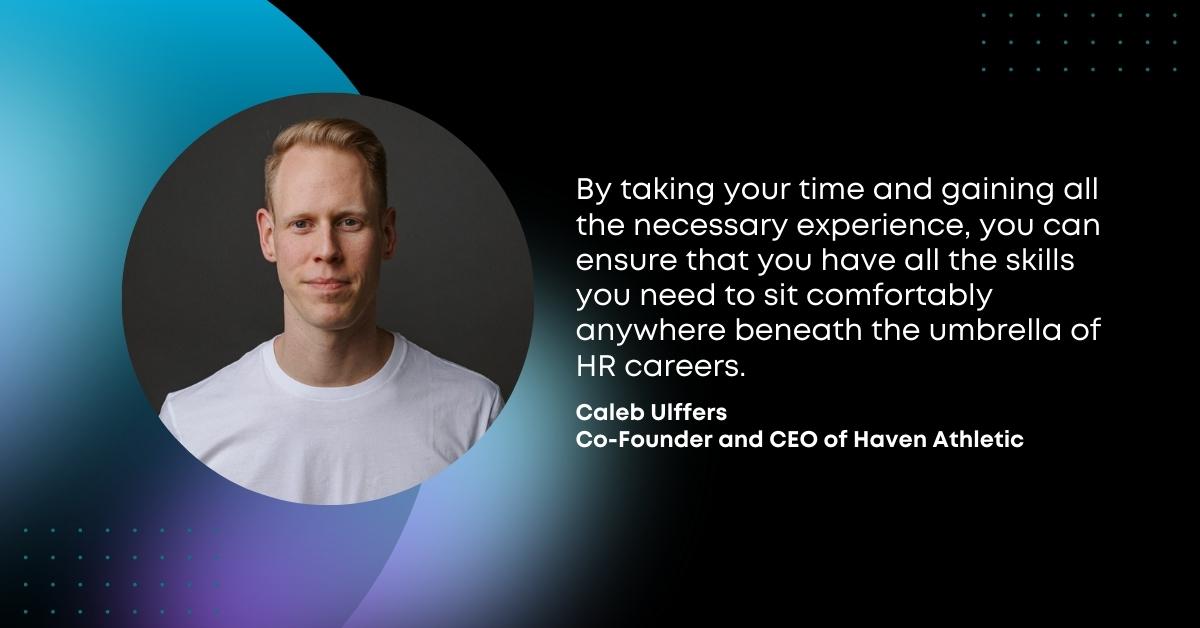What is one thing you need to do to build your HR career?
To help you build your HR career successfully, we asked experienced HR managers and business leaders this question for their best insights. From learning as much as you can to determining whether you should specialize or not, there are several tips that may help you know what to do to build a successful HR career.
Here are eight things to do to build your HR career:
- Learn as Much as You Can
- Get Involved With Professional HR Organizations
- Build Up Your Level of Experience
- Advance Your Skills
- Think Ahead and Have a Plan
- Start by Reading The Book Talent by Tyler Cowen
- Get Certified
- Determine Whether You Should Specialize or Not
Learn as Much as You Can
HR covers a wide field of tasks and necessary skills to complete them. It can do you a world of good to expand your knowledge in your field to other aspects of Hr that you are less familiar with. If you primarily are used to handling payroll related tasks for example, it doesn’t hurt to understand the process behind dealing with staff complaints and conflict resolution. The more related skills you have the more versatile you’ll be when employers consider you for positions. Expand your mind and become proficient in all aspects of your field. It can only help your career goals.
Boye Fajinmi, TheFutureParty
Get Involved With Professional HR Organizations
Whether you are a student or an HR professional in whatever stage of your career, you need to get involved with the local HR professional organizations. There are hundreds of SHRM chapters throughout the United States (and internationally), and there is bound to be one close to you. I started attending my local chapter’s monthly programs at the urging of my professor, and early on I got to meet so many individuals that were more than willing to lend an ear and provide advice to guide you in the right direction.
My personal experience revolves around my involvement with SHRM. When I went to my first job in HR, I was surprised when the interviewer came in and it was someone I had met and chatted with at one of the programs I attended!
Make the most out of your interactions, keep in touch with other HR professionals, volunteer in your local chapter, volunteer in the community. As I have learned over the years, all these connections count and will help you when you least expect them!
PATTY HICKOK, NANA Regional Corporation
Build Up Your Level of Experience
Experience is a powerful tool in building your HR career. You shouldn’t be afraid of starting at the bottom of the ladder in order to build up your level of experience. HR is a multifaceted, nuanced field that often requires both technical knowledge and emotional intelligence, depending on where you land within the field or the tasks expected of you in your role. Developing those skills is a matter of practice as much as it is of industry knowledge. By taking your time and gaining all the necessary experience, you can ensure that you have all the skills you need to sit comfortably anywhere beneath the umbrella of HR careers.
Caleb Ulffers, Haven Athletic

Advance Your Skills
The recent HR debacle at Uber is a clear indication of the growing importance of a competent HR department. Sometimes basic HR knowledge is not enough to solve various employee-employer issues. It is important for people in HR to have the necessary skill, knowledge and experience. It is only then that they will be able to effectively streamline an organization’s goals with the human entities.
An HR department without said attributes will go through what Uber went through.
And so, my advice to anyone who wants to build their career in HR . Is to advance their skills . The current employee demands are fluid and one must always be prepared . It is up to you to take short courses and earn certificates that will prepare you for anything. Advancing your skills and having certificates is also advantageous in the job market . By advancing your skills you are also building your resume thus increasing your value.
Kevin Muthomi, FastPaydayLoans.co.uk
Think Ahead and Have a Plan
Building your HR career is much easier when you plan your education, work experience, and life around the field. Thanks to mapping out your HR career path and having long-term plans, you can determine the direction in which you want to move in the future and how to achieve your professional goals. With many possibilities to grow and a vision of where you would like to be, you can focus on your competencies and interests and build your career based on them.
Agata Szczepanek, Resume Now
Start by Reading The Book Talent by Tyler Cowen
HR is in many ways going through the same transformation that marketing did some 20 years ago – from a highly intuitive approach to a more analytical one. Talent, a recently published book by Tyler Cowen and Daniel Gross, will give you helpful frameworks on how to think about this transformation.
Atta Tarki, ECA Partners
Get Certified
Getting certified is essential to advancing your HR career and staying on top. Certifications offer new skills and experiences that strengthen your portfolio and make you a promising candidate for promotion. A certified HR professional is ten times more likely to get hired by leading organizations. Through HR certifications, you can achieve your career objectives and show exceptional performance. It will also help you find lucrative employment opportunities in developed countries and earn a passive income. Presently, the best HR certification is Professional in Human Resources (PHR), which covers tactical/logistical orientation, human resources management, and program implementation.
Yousaf Saleem, USTitleLoans
Determine Whether You Should Specialize or Not
Ask yourself a question – “Do I appreciate being a generalist and want to stick with a variety of tasks or do I seek for something more specific and want to become a specialist?” It’s easy to have that impression that generalists are less valued than specialists, but in reality it’s quite the opposite.
What’s more, there’re tons of companies looking solely for HR generalists. This choice is of great importance, because it’ll surely influence your future job decisions.
Don’t hurry with making up your mind, you don’t have to do it now, but try to not table it over and over again – there is large number of HR professionals who missed the boat.
Arkadiusz Terpilowski, Primetric
Terkel creates community-driven content featuring expert insights. Sign up at terkel.io to answer questions and get published.






